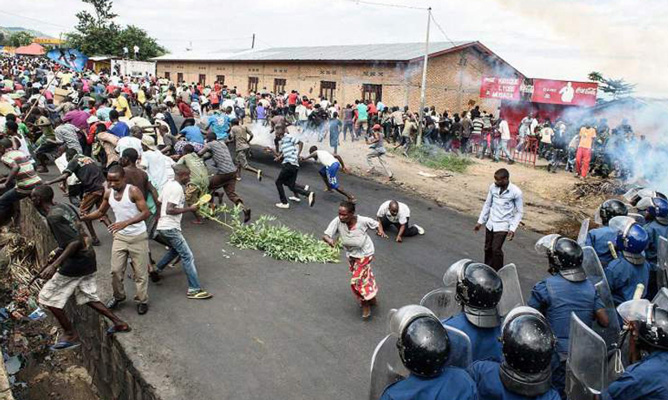
WHEN night falls, the gunfire starts across Burundi’s capital; when the sun rises, residents count the bodies.
Mail and Guardian Africa That’s the grim routine in Bujumbura, three months since President Pierre Nkurunziza regained office in a disputed election.
The escalating violence raises the specter of civil war in the East African nation, a decade after the end of an ethnic conflict between the majority Hutu and minority Tutsi communities that left 300,000 people dead.
Political assassinations and other extra-judicial killings have claimed 240 lives since April, Zeid Ra’ad Al-Hussein, the United Nations high commissioner for human rights, said on Monday. There were “credible allegations” of torture by authorities, he told a Security Council meeting in New York.
“The country is now at a critical juncture,” Ahmed Salim, a Dubai-based analyst at Teneo Intelligence, said by e-mail. “The risk of internal conflict and civil war is there and could be sparked by further targeted killings and assassinations.”
Nkurunziza blames insurgents for the violence, which killed at least 13 people over the weekend and has driven more than 180,000 others to flee to neighbouring countries in the past six months. A nation of about 9.3 million, Burundi holds 6% of the world’s nickel reserves. Its main exports are coffee and tea, with agriculture accounting for about 40% of the $3.1 billion economy.
Last week, hundreds of residents of Bujumbura’s Mutakura district abandoned their homes, describing heavy gunfire and scenes of bodies on the streets. Security forces searched the district on Sunday, after the passing of a deadline Nkurunziza gave his opponents to disarm. Human Rights Watch on Tuesday urged security forces to exercise restraint and not use the operations “as a license to kill.”
“Reckless and threatening speeches by the president and other ruling party officials have created panic,” Daniel Bekele, the group’s Africa director, said in a statement. “The Burundian security forces have been responsible for numerous human rights violations in the past months, yet the authorities often just blame ‘criminals’ and ‘terrorists’ and ignore security officials’ deadly use of force.”
- Chamisa under fire over US$120K donation
- Mavhunga puts DeMbare into Chibuku quarterfinals
- Pension funds bet on Cabora Bassa oilfields
- Councils defy govt fire tender directive
Keep Reading
Term limit
Burundi’s 12-year civil war erupted in 1993 when the first democratically elected president, Melchior Ndadaye from the Hutu ethnic group, was assassinated by members of the Tutsi-dominated army.
While Nkurunziza’s opponents say his July re-election violates a two-term limit stipulated in peace accords that ended that conflict, supporters say his first term didn’t count because he was chosen by parliament rather than by popular vote.
The Brussels-based International Crisis Group said Nkurunziza appeared intent on using force to quell opposition. The research group last week called for diplomatic intervention led by the African Union to defuse a situation that involves “the possibility of mass atrocities and civil war.”
Foreign Minister Alain Aime Nyamitwe told the Security Council his country is pursuing negotiations and peace initiatives, according to the UN website.
“Burundi is not in flames,” he was quoted as saying. “My government is not against dialogue,” he said.
Northern rebellion
While a return to all-out war on the scale seen during the 1990s and 2000s is unlikely, a low-intensity rebellion is emerging in northern Burundi, led by army defectors and Nkurunziza opponents who attempted a coup in May, according to Christoph Wille, an analyst with Control Risks.
“Nkurunziza is unlikely to complete his current mandate and unless there is sudden progress on dialogue, which appears unlikely, he is likely to be overthrown in a coup d’etat, which in turn would plunge the country even deeper into crisis,” Wille said by e-mail. “The opposition is internally divided and heavily marginalised. The real threat stems from defections from the ruling camp, divisions in the security forces and broader polarisation of society.”
An opposition alliance, which includes an ex-rebel commander and a former vice president who fled the country after the unrest began, met in Ethiopia in August to choose a leader and discuss ways to protest against Nkurunziza’s rule.
To date, the conflict had been politically, rather than ethnically, motivated, according to Salim. “Opposition of the Nkurunziza government stem from both Hutu and Tutsi ethnic groups, which may explain why the violence has not spiraled out of control,” he said.
While the U.S. and European nations may impose stricter sanctions on Burundi and threaten further aid cuts, they are probably too preoccupied with other crises to consider UN intervention, Wille said. African nations in the region have their own problems to deal with.
“Several countries in the region, from Uganda and Rwanda to Democratic Republic of Congo and Congo-Brazzaville, face sensitive transitions in the next couple of years in which incumbent leaders are desperately trying to hold on to power,” he said. “This limits their capacity to engage constructively with the Burundian opposition.”











